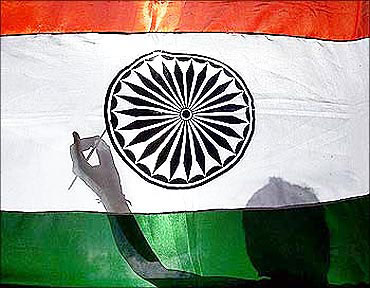Photographs: Reuters T N Ninan
Three weeks ago, The Economist noted a key transition in the global economy.
It pointed out that the emerging markets now account for a greater share of world gross domestic product (GDP) than the developed economies.
The magazine also pointed out that while the rich world's output was still below 2007 levels, the emerging economies had grown by 20 per cent since then. Its conclusion: "The rich world's woes have clearly hastened the shift of global economic power towards the emerging markets."
. . .
India may be 3rd largest economy a decade earlier!
Photographs: Reuters
A useful reference point for confirming this is Goldman Sachs' Brics report of 2003, which postulated the then novel notion that the four Brics economies (Brazil, Russia, India and China) would become larger than the economies of the G6 by 2040.
Goldman also forecast that China would overtake the United States and become the world's largest economy by 2041.
Eight years ago, those projections were considered far-out. In 2011, they read like the cautious forecasts of someone who likes to hedge his bets.
. . .
India may be 3rd largest economy a decade earlier!
Photographs: Reuters
For a start, make three plausible assumptions: that the US will be stuck in a low-growth trajectory, that the yuan will rise annually against the dollar by the 5 per cent that it has been doing in recent years, and that China will slow down but grow by at least 8 per cent annually.
Taken together, they mean that China's GDP would have reached $19 trillion by 2021, and probably become as big as the US (which is $14 trillion today).
That would be an astonishing two decades ahead of the Goldman schedule. The phrase that comes to mind is Alvin Toffler's Future Shock -- the future is getting here at a faster rate than anyone had thought possible.
. . .
India may be 3rd largest economy a decade earlier!
Photographs: Reuters
Then look at India. Assume that the Planning Commission's annual growth target for the next five years (9 per cent) is missed, and India manages only 8 per cent -- the same as in the last decade.
If you also assume 6 per cent inflation, and a steady rupee-dollar exchange rate, India's GDP would more than treble in dollar terms by 2021, be as big as a stagnant Japan's, and therefore poised to become the third largest economy in the world -- a decade ahead of the Goldman schedule. More Future Shock.
A third Brics country, Brazil, has benefited from the commodity boom, its currency has soared, and its GDP is now nearly as big as Italy's -- something that Goldman said would happen only by 2025.
. . .
India may be 3rd largest economy a decade earlier!
Photographs: Reuters
With these country scenarios as a backdrop, if you re-assess the big prediction by Goldman -- that Brics would be bigger than the G6 by 2040 -- the plausible scenario today is that they might overtake the G6 a full decade before that date.
If the theme since 2003 has been about the coming power shift in global affairs, some transitions have already occurred -- as The Economist has noted.
But the period from now till 2021 is going to be the defining decade. So far the Brics economies have had momentum, now they will also have mass. The difference is between a bird hitting a plane, and a meteor hitting Earth.
. . .
India may be 3rd largest economy a decade earlier!
Photographs: Reuters
The mandatory word of caution has to be that it is always possible for countries to veer off course. You only have to study how the advanced economies have committed hara-kiri since 1999, to see how the most assured futures can turn into troubled realities.
And who is to tell that the virus will not spread? When it comes to the emerging markets, every decade other than the last one has claimed one or more victims.
Still, the default scenario today is one in which the global power shift is round the next corner.








article